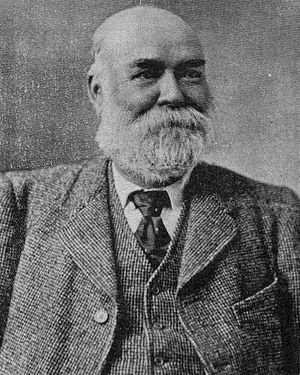studied engineering, and has all the tools and appliances necessary to such a large undertaking, he may complete it. The individual without those tools and that knowledge would find the task impossible. He must first study the requisite means. From Monger's Mr. Quinlan went to the house of McRae and Co., general merchants at Roebourne. The pearling industry at this port was then in its heyday, and business at all the mercantile houses was brisk. For two years he extended his experience at Roebourne, and at the end of that period was able by close observation to recognise where his opportunities lay. He returned to Perth, and became proprietor of the Shamrock Hotel. Then but twenty-two years old, he was, indeed, a youthful landlord, but he managed this important hostelry most successfully. The Shamrock is the oldest existing hotel in Perth. Soon after his entering into possession in 1883 he was married to Miss Connor, daughter of one of the largest Perth property-holders. He conducted the Shamrock for over nine years.
During all this while Councillor Quinlan had been studying the public affairs of his country, and his thoughts made him look with favour on a public life. His first step in this direction led to his entrance to the Perth Municipal Council. In 1889 he was elected to this body unopposed for the Central ward. So conspicuous have been his services in the eyes of ratepayers that he still retains his seat in the Perth City Council, and has been returned three times without opposition. This is a flattering testimony to his ability in municipal affairs. He endeavours to carefully subserve the interests of his ward, as well as the interests of the whole municipality, and so satisfied are all classes with what he has done that they do not oppose him on the hustings. Councillor Quinlan is an active and zealous member of the council.
When the first elections under Constitutional Government took place in 1890 for the new House of Assembly he was twenty-nine years of age. His knowledge on political subjects, and particularly on the requirements of the Perth constituency, was sufficiently marked to induce the electors for West Perth to requisition him to stand for the Assembly in their interests. He was duly nominated and elected, and for more than three years represented his constituency with sincerity. His deportment in the House showed that the years of his life had been well spent, and whether in debate, or in that more secluded sphere—the smoke room—where so many questions of public moment are decided, he was able to clearly enunciate his views. At the general elections of 1894 he was opposed by Mr. B.C. Wood and Mr. R. S. Haynes, two prominent Perth gentlemen. The struggle was a worthy one, and there was little to choose between the three candidates. When the votes were finally counted they showed Mr. Wood to be elected, with Councillor Quinlan only nineteen votes behind him—a result almost as satisfactory as a win under the circumstances. At the general elections in May, 1897, Mr. Quinlan was elected to the Assembly for the Toodyay constituency by an overwhelming majority.
In 1893 Councillor Quinlan was created a Justice of the Peace, a distinction which is more select in Western Australia than in the eastern colonies. He is a member of the Colonial Hospital Committee, director of the Stanley Brewery Company, and director of the South British Insurance Company.
This sketch shows that Councillor Quinlan has been able to successfully gauge opportunity. His rise is flattering to his own industry and intelligence, and he merits compliment for so energetically applying himself to the battle before him. He is now well and favourably known in business and political circles, and what with his popularity and shrewdness he will probably perform many works of usefulness for Western Australia in the future.
JOHN EDGAR, J.P.
 |
Photo by JOHN EDGAR, J.P. Greenham & Evans. |
AUSTRALIAN pioneers supply examples of what energy and determination will do. Most of the successful and rich men of Australia have themselves, in their enterprise and laudable ambition, to thank for their present happy positions. Certainly the colonies held out splendid opportunities for the acquisition of wealth in one lifetime, but it was not everyone who was sufficiently courageous to take the opportunities. Some were too cautious, too nervous, preferred to bury their one talent under the ground. Meanwhile, the successful men invested their two, and five, and ten talents, and now they have many thousands.
We have already told in the Hon. A. R. Richardson's biography the story of the few young men who left Portland,
